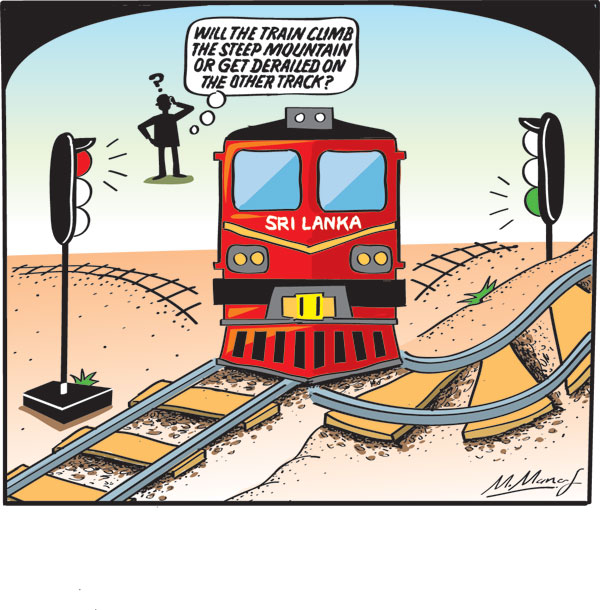Columns
Challenges and complexity of achieving socio-political transformation
View(s): The government’s Clean Sri Lanka initiative has drawn a wide spectrum of views, ranging from criticism, scepticism, cautious optimism, and expectations.
The government’s Clean Sri Lanka initiative has drawn a wide spectrum of views, ranging from criticism, scepticism, cautious optimism, and expectations.
Difficult task
Let us hope that it is not a distant dream but a new awakening of the country to unite its diverse people to achieve a nation with values and work ethics in keeping with the government’s aim for a rich and prosperous country for all.
However, achieving the government’s goal for a political, social, and cultural transformation is an enormously difficult task.
Spectrum of views
The first two weeks of the Clean Sri Lanka initiative have evoked a multiplicity of difficulties. Implementing the Clean Sri Lanka initiative to transform Sri Lankan society, its values, conduct, behaviour, and political culture has run into difficulties. However desirable the Clean Sri Lanka socio-economic transformation is, its effective and successful implementation is wrought with immense difficulties and obstacles. It is a Herculean challenge. Its objectives cannot be achieved in a hurry. It will take many months, much effort, and attitudinal changes to reach the peak of the promised rich and prosperous country for all.
Today’s column
Today’s column focuses on the complexities, difficulties, and obstacles to achieving a political, social, and cultural transformation with a new, socially responsible value orientation.
Beginning
Unfortunately, the initial phase of the Clean Sri Lanka programme began with “cleaning” private buses and three-wheelers, and this was seen to be a trivialisation of the programme’s lofty objective of achieving a holistic social transformation.
It has led to criticisms and doubts as to whether it was really a programme of social transformation. There is a need to infuse a fresh, serious new beginning into the programme.

Distraction
In as much as the people’s expectations are high, the problems and challenges of implementing it are formidable. The New Year that began with expectations of a social transformation has unfortunately been distracted owing to getting its priorities wrong.
Although the President emphasised that the “Clean Sri Lanka” programme was not confined to cleaning the environment but also to usher in a national social transformation, the initiative began on the wrong footing—removing additional gadgets and decorations from private buses and three-wheelers.
This trivialised the envisaged reform programme and gave ample fodder to critics to scoff at it. Now there is a need to restart the programme, getting the priorities right.
This is indeed an unfortunate false start as it were. As a result, even those who were hopeful of realising the dream of a new country and a new society have become sceptical.
Radical transformation
The plain truth is that only a radical reformation can rescue the country from the depths it has fallen into.
Will the government be able to eradicate corruption, forge national unity, and usher in a political culture and social values conducive to development?
Analysis
An analysis of this rather insignificant turn of events brings to the fore the dialectics of the JVP-NPP alliance. Some analysts argue that the diverse and incompatible partners of the JVP/NPP coalition would surface more as time goes on.
Incompatibilities
The incompatibilities are the views of the JVP Marxist faction and the moderate democratic socialist group both in the JVP and NPP. These conflicts would surface from time to time.
Coalition
In other words, the government is a coalition of sorts and needs to come to a consensus on its policies. If not, the government’s implementation of policies would be vitiated.
Past
These dialectics and contradictions, the origins and history of the JVP, especially the two insurgencies in 1971 and 1988-89, have led to various interpretations of the JVP’s economic policies and foreign relations. This was especially so before, during, and after the President’s Indian visit. Political commentators were particularly concerned about the JVP’s leanings towards China and its relations with India.
View
Most Indian commentators were of the view that the government had veered towards a left-of-centre administration rather than a Marxist one.
Implementation
President Anura Kumara Dissanayake’s visionary eloquence needs effective implementation of pragmatic policies.
Concluding reflection
We have arrived at a turning point in the country’s history that cannot be frittered away. First and foremost, the political transformation could usher in an era of national unity that would contribute immensely to the country’s development. The reduction of corruption would have immense benefits for the economy. Nevertheless, the problems of the country are enormous, and a holistic transformation, as envisaged by the government, is mandatory.
Final word
The effective and successful implementation of the Clean Sri Lanka socio-economic transformation is a prerequisite that we must fulfil to be a rich and prosperous country in the fullness of time.
Buying or selling electronics has never been easier with the help of Hitad.lk! We, at Hitad.lk, hear your needs and endeavour to provide you with the perfect listings of electronics; because we have listings for nearly anything! Search for your favourite electronic items for sale on Hitad.lk today!


Leave a Reply
Post Comment